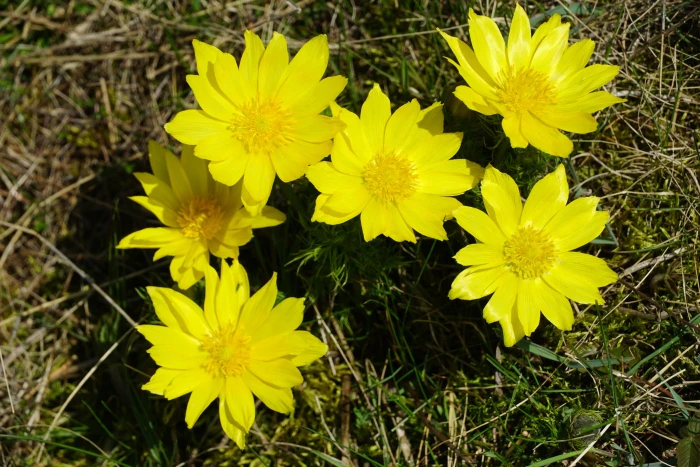Spring Pheasant’s Eye
/
(Adonis vernalis)
Spring Pheasant’s Eye (Adonis vernalis)
/

© xulescu_g
CC BY-SA 4.0
Image By:
© xulescu_g
Recorded By:
Copyright:
CC BY-SA 4.0
Copyright Notice:
Photo by: © xulescu_g | License Type: CC BY-SA 4.0 | License URL: http://creativecommons.org/licenses/by-sa/4.0/ | Uploader: xulescu_g | Publisher: iNaturalist |

























Summary
Adonis vernalis, commonly known as Spring Pheasant’s Eye, is a perennial herb that is native to a variety of habitats including open forests, forest clearings, steppes, and dry meadows across Eurasia, from Western Europe to Siberia. It typically grows to a height of 10-30 cm (4-12 inches) and is known for its bright yellow flowers that can reach up to 3 inches in diameter, blooming in early to mid-spring. The flowers are showy and conspicuous, making it a desirable plant for spring interest in gardens.
Spring Pheasant’s Eye is valued for its early-season blooms and is often used in rock gardens, alpine collections, and as part of mixed herbaceous borders. It prefers full sun to partial shade and thrives in well-drained, alkaline (calcareous) soils. Gardeners should be cautious as all parts of the plant are toxic due to the presence of cardiostimulant compounds, which have been historically used in traditional medicine to treat heart-related ailments. It is rarely bothered by pests or diseases but should not be ingested by humans or animals.CC BY-SA 4.0
Spring Pheasant’s Eye is valued for its early-season blooms and is often used in rock gardens, alpine collections, and as part of mixed herbaceous borders. It prefers full sun to partial shade and thrives in well-drained, alkaline (calcareous) soils. Gardeners should be cautious as all parts of the plant are toxic due to the presence of cardiostimulant compounds, which have been historically used in traditional medicine to treat heart-related ailments. It is rarely bothered by pests or diseases but should not be ingested by humans or animals.CC BY-SA 4.0
Plant Description
- Plant Type: Herb
- Height: 0.5-1 feet
- Width: 1-1.5 feet
- Growth Rate: Moderate
- Flower Color: Yellow
- Flowering Season: Spring
- Leaf Retention: Deciduous
Growth Requirements
- Sun: Full Sun, Part Shade
- Drainage: Medium, Fast
Common Uses
Border Plant, Butterfly Garden, Low Maintenance, Water Garden
Natural Habitat
Native to open forests, forest clearings, steppes, and dry meadows across Eurasia
Other Names
Common Names: Yellow Pheasant’s Eye, Spring Adonis, Goritsvet Vecennij, Oxeye, Oxeye Daisy, Pheasant’s-Eye, False Hellebore
Scientific Names: Adonis vernalis, Adonanthe apennina, Adonanthe vernalis, Adoniastrum vernale, Adonis apennina, Adonis apennina var. dahurica, Adonis apennina var. sibirica, Adonis dahurica, Adonis dahurica
GBIF Accepted Name: Adonis vernalis
